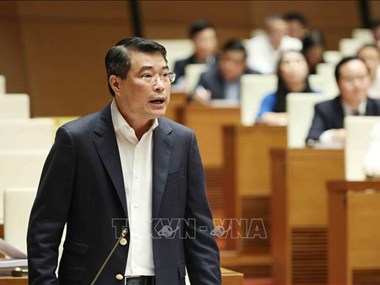Can Van Luc and his research team from BIDV, in their latest report about the US-China trade war and its effects on finance, monetary and stock markets, pointed out that it will lead to big changes in the international forex market. The US dollar has appreciated, while the Chinese yuan has depreciated.

Though Vietnam’s forex market is still stable, thanks to balanced supply and demand, profuse liquidity and increased forex reserves, the fluctuations in the international market will affect the dong/dollar exchange rate.
In late June and early July 2018, when there were signs of trade war escalation, the dong/dollar exchange rate fluctuated heavily with the dollar price exceeding the VND23,000 per dollar threshold, but later cooled down thanks to tmely intervention by the State Bank of Vietnam (SBV).
|
Though Vietnam’s forex market is still stable, thanks to balanced supply and demand, profuse liquidity and increased forex reserves, the fluctuations in the international market will affect the dong/dollar exchange rate. |
The exchange rate was stable in the first four months of 2019, but began fluctuating more heavily in early May. By the end of May 24, the exchange rate had increased by 0.95 percent compared with the beginning of the year. From May 6 to May 24 alone, the increase was 0.5 percent.
In the medium and long term, Luc and his co-workers believe that the exchange rate would mostly depend on macroeconomic factors such as GDP growth rate, general payment balance, trade balance, FDI and gold price.
However, under the current exchange rate management policy, which calculates the official exchange based on a basket of eight currencies, once the Chinese yuan depreciates, the Vietnam dong will be under pressure of depreciation. This is because Vietnam-China trade accounts for 23 percent of total export/import turnover as seen in 2018.
The possibility of China devaluing the Chinese yuan is not high, partly because it fears capital flight, which occurred in 2015. Besides, China doesn’t want to be listed as a ‘currency manipulator’ which may worsen the trade war.
In general, Luc said the exchange rate will be within control and the 2-3 percent depreciation of the dong in 2019 would be acceptable.
In the latest news, the US did not add Vietnam to the list of currency manipulators in the April watchlist after Vietnam provided information proving that it had not devalued the dong.
Economists say Vietnam should not devalue the dong just to make exports cheaper to boost exports.
“Don’t let confidence get lost. Devaluing the currency is the best way to cause a loss of confidence, ” said Tran Du Lich, former director of the HCMC Economics Institute.
“Vietnam needs to use other measures, not the exchange rate, to deal with foreign trade issues,” he said.
Thanh Lich

Forex reserves reach highest level to date
The State Bank of Vietnam (SBV) obtained a large amount of foreign currencies in the first half of 2019, pushing foreign exchange reserves recorded in the period to the highest level to date.

Forex rate under pressure of US-China trade tensions
The foreign exchange market has heated up when the daily reference exchange rate set by the State Bank of Vietnam continuously climbed to new record levels and the VND/USD rates listed at commercial banks also surged.
 Vietnam has devuded not to devalue the dong in order to gain advantages in export.
Vietnam has devuded not to devalue the dong in order to gain advantages in export.